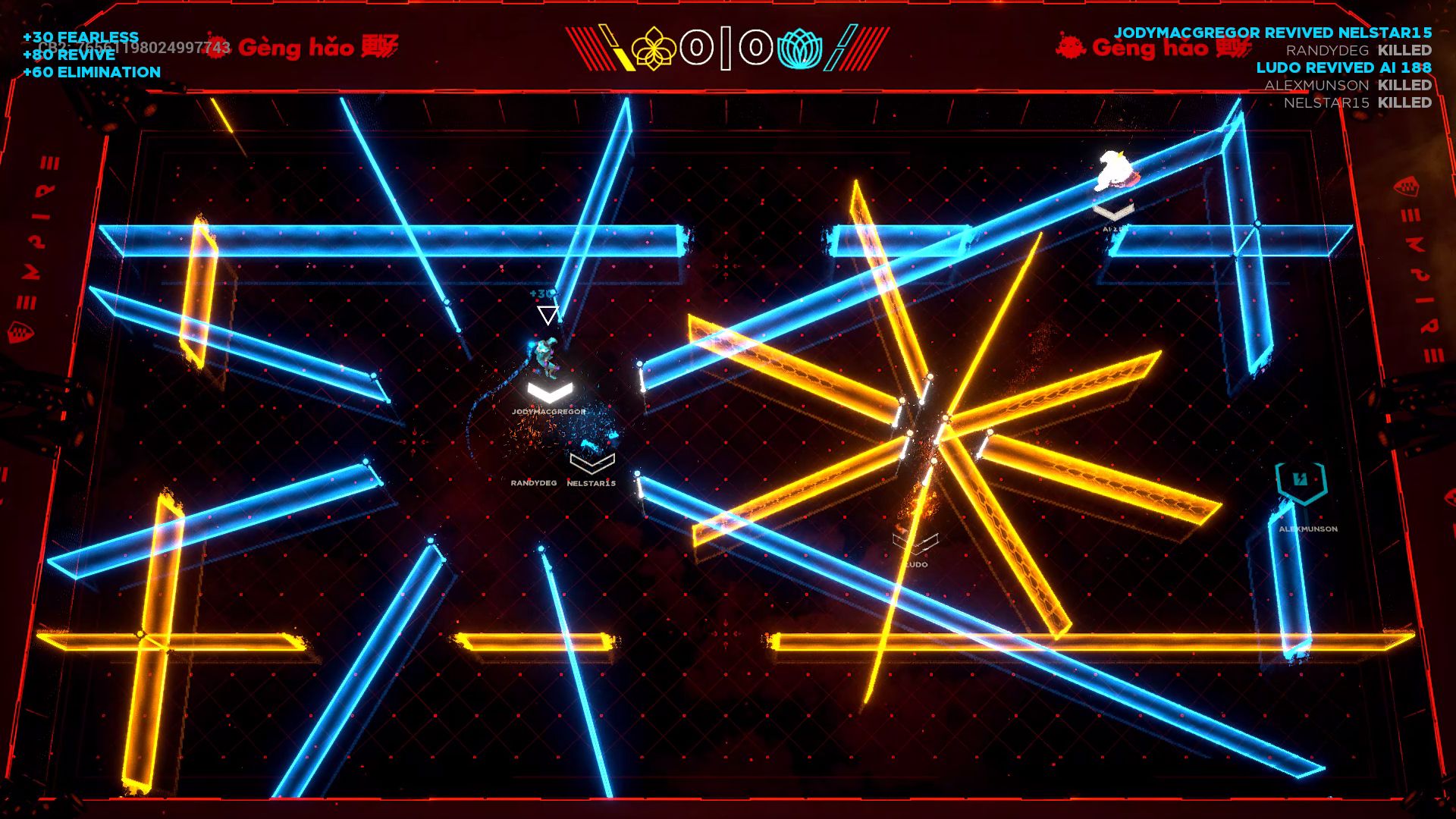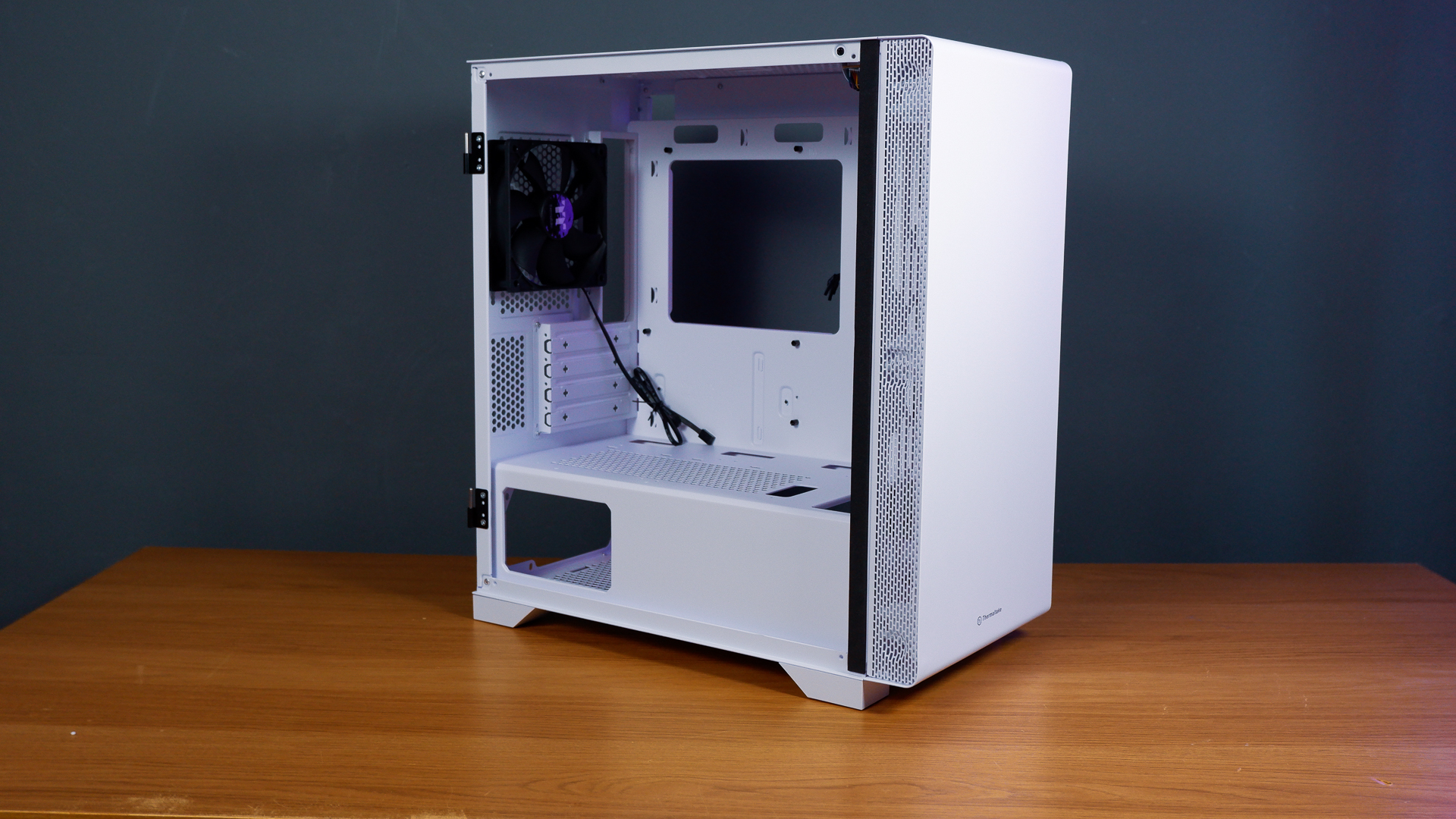Eat lasery death in neon futuresport Laser League
It's the year 2150 and sport has gone full Tron in this team-based multiplayer game from the creators of OlliOlli.

I'm always down for videogames about imaginary full-contact sports, whether we're talking Speedball, Blood Bowl, Beast Boxing Turbo, or Rocket League. Does it count as full-contact sport when it's cars colliding with each other? Anyway, there's a new entry in the genre of somewhat violent speculative sports games, and it's called Laser League.
Laser League is being made by Roll7, who you may know from the OlliOlli skateboarding games or their surreal side-scrolling shooter Not A Hero. Laser League is something very different, a top-down multiplayer game with Tron-style visuals, playable locally or online. It's currently in closed beta, and I got to participate in a few matches last week.
Here's how it works: two teams of up to four players race toward 'nodes', flagpole-looking things that fall down onto the pitch like pins, and when you touch a node it transforms into a laser wall of your team's color (orange or teal). You can pass through your team's walls, but touch the other walls and you die.
Also, the walls move.
At its most basic it's about map control, scrambling to hit new nodes as they land while being aware of the other team and either beating them to nodes or getting out of their way. This is complicated by the way the pitch loops, like the maze in Pac-Man—run off one end and you appear at the other. In the gif above I'm the blue guy who does exactly that, then realizes he's surrounded by orange lasers and sprints back to safety.
Each player chooses one of six classes with different abilities, from a short-range fatal attack to stealing nodes or turning invulnerable. These powers take a long time to charge up and I sometimes found it hard to tell when they were active—while the stun attack throws up an obvious circle of crackling energy the others were subtler, and it was occasionally unclear what I'd been hit by or whether my own abilities were still up. It felt like part of an on overall readability problem, with some of the other players having trouble telling where they were once things got frantic, which is hopefully something to be addressed in future updates.
These classes add tactical considerations and make exciting plays possible—as the Ghost class I turned on invulnerability then sprinted through the other team's walls to grab a node or revive a team-mate, which is done by simply running over the spot where they fell.
Keep up to date with the most important stories and the best deals, as picked by the PC Gamer team.
But it felt like the team that won usually wasn't the team who most effectively used their snipe or bash or stun moves. Rather, it was the team who better coordinated their movements—triggering a chevron-shaped wall then running behind it as it shot into enemy territory like an arrowhead, or making it to a central node that fired off a laser starburst at exactly the right time. Grabbing a power-up that reverses the direction of wall movement, revives all fallen players, or swaps laser colors can also completely flip the momentum of a round.
The team that loses a round has the option to change classes while winners are locked in, which feels like a nice way of giving underdogs a leg up. And at the end of a full match both teams get some experience points, which can be spent on cosmetics like profile pics and outfits (the unlocks will only ever be cosmetic, we're assured).
While at first Laser League looks eye-baffling, by my second match I could follow what was going on, even if I wasn't playing with a great deal of skill yet. After too many multiplayer games that demand hundreds of hours to comprehend, that's refreshing.
Laser League is currently in closed beta and will make it into Steam Early Access in 2018.

Jody's first computer was a Commodore 64, so he remembers having to use a code wheel to play Pool of Radiance. A former music journalist who interviewed everyone from Giorgio Moroder to Trent Reznor, Jody also co-hosted Australia's first radio show about videogames, Zed Games. He's written for Rock Paper Shotgun, The Big Issue, GamesRadar, Zam, Glixel, Five Out of Ten Magazine, and Playboy.com, whose cheques with the bunny logo made for fun conversations at the bank. Jody's first article for PC Gamer was about the audio of Alien Isolation, published in 2015, and since then he's written about why Silent Hill belongs on PC, why Recettear: An Item Shop's Tale is the best fantasy shopkeeper tycoon game, and how weird Lost Ark can get. Jody edited PC Gamer Indie from 2017 to 2018, and he eventually lived up to his promise to play every Warhammer videogame.

